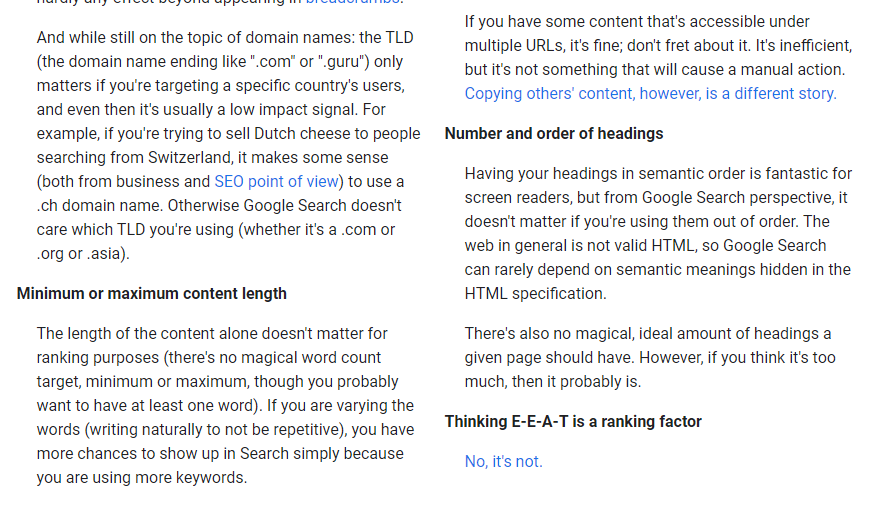As I wrote previously, Google E-E-A-T is not a ranking factor. Since writing this, Google has gone on to list a series of SEO myth-debunking statements (which we called out over a decade ago) yet its just not stopping the Ivory Tower Copywriters who keep insisting it is. Its not even possible. And when asked, on Reddit and Twitter, they offer conjecture and misinformation – often linking to content they haven’t even read (or didn’t understand, which raises questions about their own thoughts as “EEAT experts”)
One such offer on Twitter and Reddit pointed to Google’s Language understanding ML and associated patents, which explain how Google tries to understand translations, citing examples from English to German. Because that’s all they can find on how Google is trying to be a content appreciation engine.
Table of Contents
ToggleGoogle’s full E-E-A-T Shutdown
How and ever, Google recently updated its Google Starter Guide – a must-read for anyone new to SEO, copywriters, web developers, and especially E-E-A-T enthusiasts.
It doesn’t get more end-of-the-road than this:

Also damning, but not enough to stop the Corporate Content Fascism that is EEAT-myth pushing, is that Google cut its contract with the company that reviews spammy websites to exclude them from its Google indices. But of course, this hasn’t stopped the most ardent of E-E-A-T fans. Again – this is cognitive dissonance.
Google HCU Update
The Google HCU update took place around September 31, 2023. Most sites claiming that they got hit during this actually got hit in October – which was when Google rolled out 1 of 9 core and spam updates, not related to HCU
Why E-E-A-T Doesn’t and Cannot Affect Ranking
Google cannot use EAT because tt cannot verify Expertise. you do not have to be an expert to rank in Google or get indexed. this is nonsense.
You can’t expect EVERY writer to be an Expert
You do not need to be an expert: I rank for topics like EDR, Threat Intelligence, Pen Testing, Load Balancing – I haven’t been a software engineer since 2003. Also, expertise is subjective. I’ve been doing SEO for 24 years but Julian Goldie is far more experienced at AI and programmatic scale. Tell me EEAT hasn’t been an ivory tower of “Well you need better content”? Or pushed by people wanting people to believe they “create better content loved by Google” – there’s no objective standard for “good” and thats a very critical point and part of freedom of speech,
But if you want to push this, please demonstrate:
- When someone writes an article – where is the Google fleet of people that fly out to interview them, in every language, in every country
Provide an objective and fair definition of expertise
- Age
- Years experience?
- Degrees or certifications
You cannot objectively apply EEAT to ANY content that is on the web. Specifically – Google has debunked the sub-elements of EEAT – like showing author bylines don’t influence rank, neither does word count, neither does spelling. EEAT is a narrow view of content played by copywriters, conjecture is not evidence.
Individual EEAT Claims now Debunked
Before yesterday’s update, Google had begun a series of debunking the individual claims made by E-E-A-T promoters:
- Author Rank/ Bylines Not A SEO Ranking Factor
- Word Count Is Not An SEO Ranking Factor
- HTML Structure Doesn’t Matter Much For Ranking
What are the Google EEAT guidelines?
The Google EEAT guidelines are pretty clear as we mentioned but here they are again:
As a reminder, these guidelines are what are used by our search raters to help evaluate the performance of our various search ranking systems, and they don’t directly influence ranking
So why do they keep pushing E-E-A-T?
One can only guess but all myths that require cognitive dissonance are usually rooted in the same gas-lighting techniques: to create a sense of expertise, especially to an audience allergic to data and the technicalities of SEO, and as a way to get around the root of SEO: Building authority.
So how DOES Google work?
Google matches content and authority. Google ingests vast amounts of data. In 2010, Google Caffeine was capable of indexing:
Caffeine lets us index web pages on an enormous scale. In fact, every second Caffeine processes hundreds of thousands of pages in parallel. If this were a pile of paper it would grow three miles taller every second. Caffeine takes up nearly 100 million gigabytes of storage in one database and adds new information at a rate of hundreds of thousands of gigabytes per day. You would need 625,000 of the largest iPods to store that much information; if these were stacked end-to-end they would go for more than 40 miles.
source: https://developers.google.com/search/blog/2010/06/our-new-search-index-caffeine
Google has been built on PageRank since day 1 and today is no different. The only way to create a currency or value in Google is through 3rd party voting – or backlinks. Like any currency, its value is set in its difficulty to obtain. The easier the link is to get – say, from twitter or facebook, the lower the value. The same in commodities – the more prevalent a commodity or ease of access, the lower the value.





